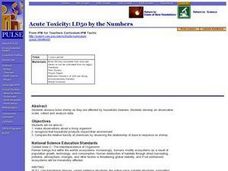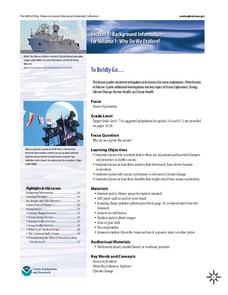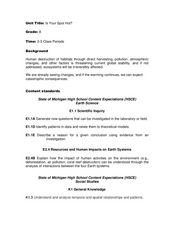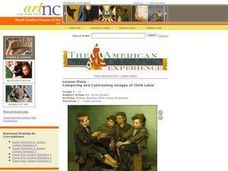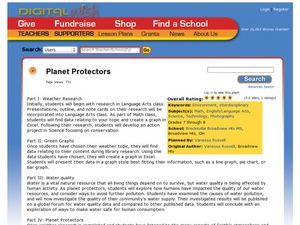Curated OER
Acute Toxicity: LD50 by the Numbers
High schoolers observe brine shrimp as they are affected by household cleaners, develop observation scale, collect and analyze data, and discuss how household products and pesticides negatively impact environment.
Curated OER
Science: 4 X 4
Students generate four statements and four questions based on their current level of understanding of the article from the engage lesson. They
evaluate the statements and questions that they have generated and those of their classmates...
Georgia Aquarium
The Ocean's Nursery
Linear perspective, estuaries, and water ways converge in a science-inspired art project. The class uses what they've learned about eco-systems, estuaries, and the food chain to create scale models of a local marsh. While the lesson is...
NOAA
To Boldly Go...
When we think of ocean exploration, many of us have visions of sunken pirate ships full of treasure or mysterious creatures of the deep. What really motivates deep-sea investigation? The first in a series of diverse six-part lessons...
Chicago Botanic Garden
Calculating Your Ecological Footprint
You can lower your ecological footprint by recycling! Lesson four in this series of five has individuals, through the use of a computer, calculate their ecological footprints. Through discussions and analysis they determine how many...
Curated OER
Is Your Spot Hot?
Eighth graders explore global warming. In this Earth Science lesson plan, 8th graders will look for Harbingers and fingerprints for different areas. The students will identify an area at risk and they will then create a presentation to...
Curated OER
Renewable vs. Non-Renewable Resources
Fifth graders are introduced to the important topic of renewable, and non-renewable, resources. They are expected to be able to correctly categorize different types of resources as renewable or non-renewable. Another emphasis of this...
California Academy of Science
Energy: A Day in My Life
If only we could harness the energy of fifth graders, our energy problems would be over! The class discusses where different forms of energy come from and how we use them. They complete a chart of the activities that they do daily that...
Curated OER
Angry Words: What Goes Around Comes Around
Students examine how angry words can effect the people and environment around them and identify ways to cope with angry feelings. They listen to the book Andrew's Angry Words by Dorothea Lachner, and participate in a simulation of how...
Curated OER
Water Cycle
Students identify the different stages in the water cycle. For this earth science lesson, students calculate the residence time of water in oceans using a mathematical formula. They explain how this cycle regulates the Earth's climate.
Curated OER
A Day In My Life
Students brainstorm how they can conserve energy in their daily lives. In this energy lesson plan, students discuss how they use energy and ways to conserve it.
Curated OER
Renewable vs. Non-Renewable Resources
Fifth graders identify renewable vs. non-renewable resources and comprehend why conservation of resources is important. They are asked what they think the words natural and resource mean. Pupils then put the words together to define...
Curated OER
Life in a Hurricane Zone
Students investigate the social effects of hurricanes. In this social studies activity, students assume the persona of residents of the Dominican Republic and write diary entries and letters regarding the devastation caused by Hurricane...
Curated OER
Comparing and Contrasting Images of Child Labor
Young scholars study child labor in the 19th century through one painting and multiple photographs. In discussion and writing, they consider the differences between photography and painting as mediums for expressing these attitudes.
Curated OER
Climate Change: Is there a Controversy
Learners explore climate changes. In this climate changes lesson, students research what causes changes. Learners search the Internet, summarize reports they find and create a poster with the information.
Curated OER
Let's Heat Things Up!
Students build and evaluate simple models to understand the greenhouse effect. They explore the role of increased greenhouse gas concentration in global warming, and the implications of global warming theory for engineers, themselves...
Curated OER
Climate Change
Students discuss problems associated with a world climate change. They examine how animals would be affected if the world heated up.
Curated OER
Barnegat Bay Watershed
Students design a model watershed. In this watershed lesson, students learn the needed parts of a watershed and how they work. Students evaluate how watersheds effect communities.
Curated OER
Global Weather and the Greenhouse Effect
Students discuss how local weather patterns effect or relate to global weather and environmental changes, explore connected nature of our planet, and examine global weather patterns, their changes, and their possible connection to global...
Curated OER
Surface Area and Measuring
Tenth graders explore volume and surface area through percentages. For this geometry lesson, 10th graders analyze the surface area of two and three dimensional shapes, then use percents and ratio to compare the two.
Curated OER
Planet Protectors
Students explore ways to protect the earth. In this environmental issues and technology lesson plan, students investigate the water quality in their community and compare their findings to the water quality in other geographic areas. ...
Curated OER
Commonalities and Differences from Africa to Cleveland as Evidence Through the Gullah Community Connection
Students explore Afro-American history. They identify the commonality between African, Carolinian and Cleveland Black culture. Students explore the water cycle, oceanography, hydrology and bio-geochemical processes. They discuss the...


